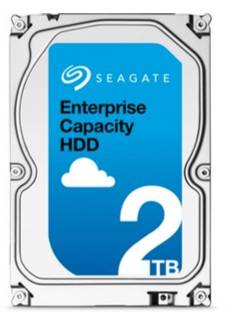This article is more than 1 year old
Seagate hauls out fat form factor throwback hard drive
Bulky, low-capacity spinner built for SMBs
It's back to the future for the latest Seagate large form factor disk with a low capacity.
The company has introduced a 3.5-inch 1TB and 2TB disk drive spinning at 7,200rpm with a slow 6Gbps SATA interface, and called it an Enterprise Capacity drive.
Remarkably, other 3.5-inch Enterprise Capacity drives of Seagate's go up to 8TB when air-filled, and 10TB when helium-filled, and have much faster 12Gbps SAS interfaces. What gives?
The new drives use ninth-generation PMR recording and are aimed at a market niche that needs an entry-level, small-capacity drive in the 3.5-inch format, not the 2.5-inch one. It's a cheap (we assume; no prices supplied) and cheerful spinner with a 128MB cache, 194MBps transfer rate, two million hours MTBF rating, five-year warranty, and supports 24x7 workloads of 550TB per year.
That's 10 times a desktop drive's workload. Seagate says the drives are built specifically to address the entry-level bulk data needs of system architects, sales engineers and owners of small to medium-sized businesses, and suggests these application areas could use it:

- Hyperscale applications/cloud data centres with replicated storage
- Scale-out data centres and big data analytics
- Legacy mainstream applications requiring 512n block size
- High-capacity density RAID storage
- Mainstream enterprise external storage arrays (SAN, NAS, DAS) Distributed file systems, including Hadoop and Ceph
- Enterprise backup and restore – D2D, virtual tape
- Centralised surveillance
When we read "High-capacity density RAID storage" in this list we thought Seagate might be being ironic but, presumably, it's done its market research and there is sufficient demand for a drive of this type.
As far as price goes, Seagate talks about this enterprise-class nearline bulk data storage drive having the lowest possible cost structure for up to five years, which encourages us to think it will be good value.
Grab a datasheet here [PDF].
One possibility that has been mentioned to us is that Seagate is merely listening to a large vendor’s request for a very cheap HDD – slow, but with relatively good reliability. If true, Seagate will have delivered. ®
